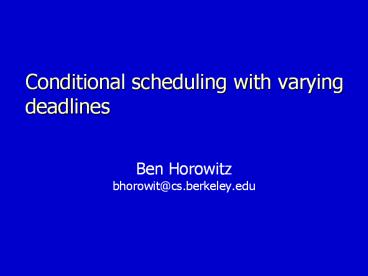Conditional scheduling with varying deadlines - PowerPoint PPT Presentation
1 / 13
Title:
Conditional scheduling with varying deadlines
Description:
Conditional scheduling with varying deadlines Ben Horowitz bhorowit_at_cs.berkeley.edu Which output: A or B? A, B each require 3 milliseconds to compute. – PowerPoint PPT presentation
Number of Views:112
Avg rating:3.0/5.0
Title: Conditional scheduling with varying deadlines
1
Conditional scheduling with varying deadlines
- Ben Horowitzbhorowit_at_cs.berkeley.edu
2
Which output A or B?
- A, B each require 3 milliseconds to compute.
- In 4 milliseconds, one will need to be output.
- Decision about which to output in 2 milliseconds.
- Speculatively start to compute both!
A due here
A, B released here
B due here
3
Varying deadlines in Giotto
- I first saw this problem when working on
precedence-constrained Giotto scheduling. - A task is invoked when the tasks actual
deadline is depends on future mode changes. - Following one set of mode changes, the task may
have a 5ms deadline, say.Following another, the
task may have a 10ms deadline.
4
Varying deadlines in Giotto
sensor
actuator
input port
output port
task 1
task 2
mode 1
mode 1
mode 1
mode 1
mode 2
mode 1
mode 3
5
Conditional scheduling problem
- Finite state machine
- Set Vertices of vertices.
- Set Edges of edges.
- For each edge e a number duration(e).
- Initial vertex v0.
- Workload
- Set Tasks of tasks.
- For each t ? Tasks,a number time(t).
- For each v ?Vertices, release(v) ? Tasks.
- For each v ?Vertices, due(v) ? Tasks.
6
Game scheduler vs. environment
v0
- Let Runs set of paths of length 2.
- Strategy is a function
- s Runs Tasks ? ?
- ?t?Tasks s((,vi ,vi1), t ) duration(vi ,
vi1 )
7
When is a strategy winning?
r t
- Consider arbitrary run, position vi .
- Consider arbitrary task t in release(vi ).
- Find first subsequent vj at which t is due.
- Let n of times t is released at/after vi ,
before vj . - Strategy must allocate n time(t) between vi
and vj .
8
Related models
- Baruah 1998a, 1998b Introduced conditional
scheduling model. - Tasks have fixed deadlines.
- EDF is optimal.
- Question is how to determine if demand exceeds
processing time? - Chakraborty, Erlebach, and Thiele, 2001
Hardness results and approximation algorithm to
answer above question. - Our model generalizes these
- Deadlines of tasks vary.
- Extends to include precedence constraints.
9
Algorithm for strategy synthesis
- Construct linear constraints on strategy.
- Solve using linear programming.
- A feasible soln is a winning strategy.
- No feasible soln no winning strategy.
- Interval constraints
- s((1, 2), A) s((1, 2), B) 2
- s((1, 2, 3), A) s((1, 2, 3), B) 2
- ((1, 2, 4), A) s((1, 2, 4), B) 2
- Task constraints
- s((1, 2), A) s((1, 2, 3), A) 3
- s((1, 2), B) s((1, 2, 4), B) 3
10
Discrete-time conditional scheduling
- What if the scheduler can make decisions only at
a restricted set of points? Switching triggered
by, e.g., a timer interrupt. - For simplicity suppose this set is the integers.
- Theorem. Deciding whether a discrete-time problem
has a winning strategy is NP-hard. - Under a reasonable definition of lateness, there
is no 2-approximation algorithm unless PNP.
11
Tree scheduling vs. DAG scheduling
- Our linear programming algorithm is
polynomial-time only if (Vertices, Edges) is a
tree. - What if the graph is a directed acyclic graph
(DAG)? - Theorem. Determining whether a DAG problem has a
winning strategy is coNP-hard. - I believe this problem is inapproximable also
12
Conclusion
- Introduced a novel model, conditional scheduling
with varying deadlines. - Developed polynomial-time schedule synthesis
algorithm for tree-shaped problems. - Discussed computational hardness of discrete-time
and DAG problems.
13
References
- Baruah 1998aS.K. Baruah. Feasibility analysis
of recurring branching tasks. EUROMICRO 1998. - Baruah1998bS.K. Baruah. A general model for
recurring real-time tasks. RTSS 1998. - Chakraborty, Erlebach, and Thiele 2001S.
Chakraborty, T. Erlebach, L. Thiele. On the
complexity of scheduling conditional real-time
code. WADS 2001.































